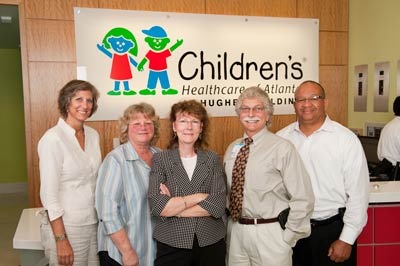College Site | Development | TOC - Department Dev Sites | CLHS TOC | Center for Law, Health & Society | News and Events | Center News | Lessons Learned from Partnership Lessons Learned from Partnership
January 1, 2010
"Better understanding of the medical record by lawyers will allow better care of our patients. That's what it's all about." - Dr. Robert Pettignano
 The Health Law Partnership (HeLP) team visited Washington, D.C., on the heels of health reform for the 5th annual Medical-Legal Partnerships (MLPs) National Summit. The summit, held in Arlington, Va. last March, kicked off with participants visiting Capitol Hill.
The Health Law Partnership (HeLP) team visited Washington, D.C., on the heels of health reform for the 5th annual Medical-Legal Partnerships (MLPs) National Summit. The summit, held in Arlington, Va. last March, kicked off with participants visiting Capitol Hill.
HeLP's medical champion Dr. Robert Pettignano and Director Sylvia Caley visited with congressional staff in the offices of Georgia Senator Johnny Isakson and Representative John Lewis. During the visits they described ways of combining the expertise of legal and health care professionals to help Georgia's low-income children.
Summit programs provided a wonderful venue for sharing ideas, discussing common challenges, and developing new strategies.
Pettignano and Caley worked with Hughes Spalding's Chaplain Johnnathan Ward and representatives from the MLP in New York City to present "How Do We Take Care of Ourselves? MLPs and Vicarious Trauma." Providing legal care to seriously ill children daily can be emotionally taxing since relationships are developed with some children who do not recover. The panel discussed common stressors confronted by MLPs and provided tips for effective management. Lawyers must cope with death and dying but are untrained in this area.
Edith Robertson, a nurse educator with Children's Healthcare of Atlanta, joined Pettignano and Caley for a presentation on reducing lawyer stress in "Demystifying the Medical Record." Navigating medical records and understanding their contents is a daunting task. The presentation identified parts of the record that may contain potentially valuable legal information. Pettignano translated "med speak" and identified relevant and meaningful data.
One example highlighted a child with severe anemia who was denied SSI benefits. When lawyers were confronted with blood test results, it was critical for them to decipher what "H&H" meant. Without a medical translator, lawyers did not know this stands for "Hemoglobin and Hematocrit," two important tests indicating the status of the child's anemia.
Professor Lisa Bliss with the HeLP Legal Service Clinic presented "Strategies for Interdisciplinary Training." The session on training law students and medical residents to work together more effectively incorporated a role play of a law student working with health care professionals on-site at a hospital.
One scenario depicted a child's head injury from a school fight. The mother told the MLP team that the child was at risk for suspension if more school days were missed for additional medical testing. The medical resident discussed only the medical injury with the family, not the school situation. If the resident had asked a few additional questions, he would have revealed that the child needed legal intervention.
"Sharing our 'lessons learned' furthers HeLP's goal to encourage the development of more programs nationally," said Bliss.